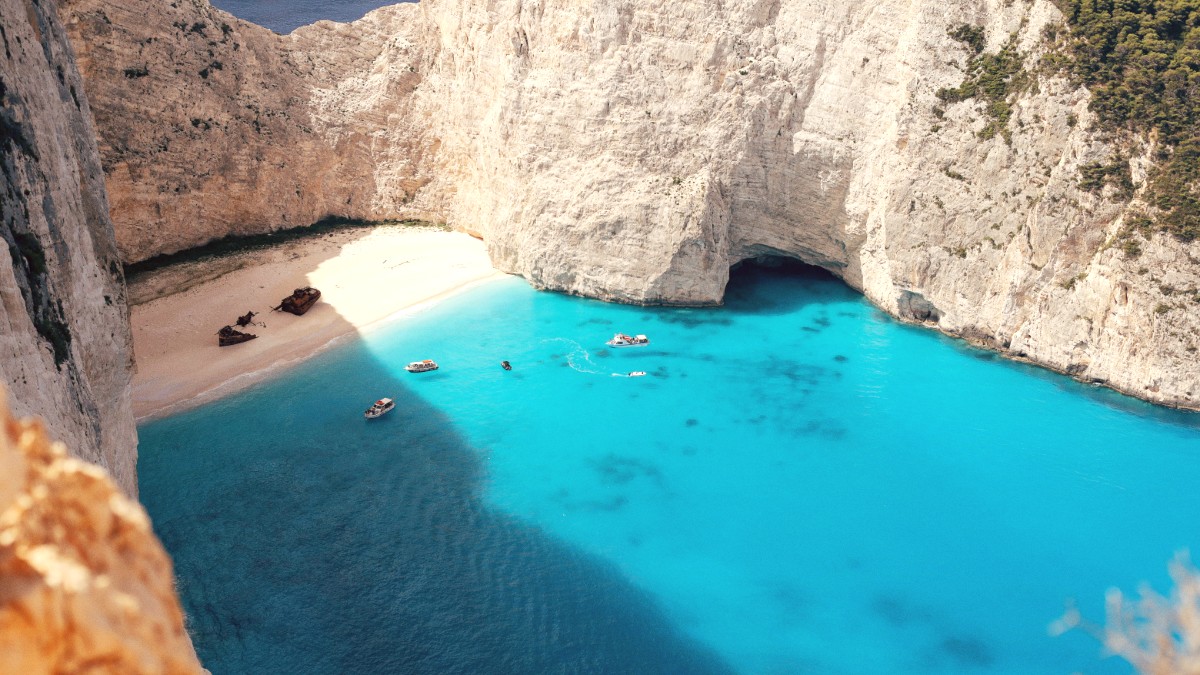
Greece
This section covers climate patterns throughout the year, including temperature, precipitation, and humidity, giving insights for planning your trip.
Spring (April-May) brings mild and pleasant weather (15-25°C). Precipitation is moderate in April, lessening in May. The island becomes lush with wildflowers, and the sea warms for swimming by late May. This season has comfortable temperatures for walking and sightseeing. Autumn (September-October) stays warm (18-28°C). Precipitation is low in September but grows in October. The sea stays warm, thereby extending the swimming season.
Spring (April-May) brings mild and pleasant weather (15-25°C). Precipitation is moderate in April, lessening in May. The island becomes lush with wildflowers, and the sea warms for swimming by late May. This season has comfortable temperatures for walking and sightseeing.
Autumn (September-October) stays warm (18-28°C). Precipitation is low in September but grows in October. The sea stays warm, thereby extending the swimming season.
July-August
Hottest weather, all tourist services fully open, warmest sea temperatures.
Very crowded, peak prices for flights and accommodation, intense heat limits daytime activity.
May-June, Sep-Oct
Pleasant weather, fewer crowds, lower prices, most services operate.
Early May sea cooler, some smaller businesses close late Oct, fewer direct flights.
Nov-April
Peaceful, lowest prices, authentic local experience, lush green landscape.
Many tourist businesses closed, limited transport, not ideal for beaches or extensive outdoor activities.
Occasional strong northerly winds, Meltemi, sometimes influence the Ionian Islands. These winds, if strong enough, sometimes cause rough seas, possibly impacting ferry schedules or water sports activities.
During hot, dry summer months, wildfire risk grows across Greece. Exercise caution, avoid discarding cigarette butts or glass, and heed local warnings. Heatwaves sometimes occur; hydrate, seek shade, avoid strenuous activity during peak heat.
Check for wind advisories.
No open flames in dry areas.
Drink plenty of water.
During midday heat.
In peak heat hours.
This section covers entry rules for many international travelers to Greece. Adherence to these guidelines aids a smooth arrival.
Greece belongs to the Schengen Area, a group of 27 European countries that have abolished passport and all other types of border control at their mutual borders.
Carry specific documents for entry, regardless of nationality. Correct documentation prevents denied entry.
Costs change depending on travel style, from frugal to luxury. This section gives a detailed cost breakdown and money-saving strategies.
| Travel Style | Accommodation | Meals | Transportation | Activities |
|---|---|---|---|---|
| Budget Traveler | €15-€30 (hostel/basic guesthouse) | €15-€25 (self-catering, street food) | €5-€10 (public buses, walking) | €5-€10 (free attractions, shared boat trip) |
| Mid-range Traveler | €40-€80 (mid-range hotel/apt) | €25-€45 (tavernas, casual restaurants) | €10-€30 (mix of bus/taxi/scooter) | €10-€35 (group tours, paid attractions) |
| Luxury Traveler | €100+ (high-end hotel/villa) | €50+ (fine dining) | €40+ (private transfers, car rental) | €30+ (private tours, exclusive experiences) |
This section covers vaccinations, common health concerns, emergency services, and general safety tips for Zakynthos.
No specific vaccinations for entry for general tourism. Ensure routine vaccinations are current.
Consult a healthcare professional for personalized advice (Hepatitis A and B, Tetanus often suggested).
Considered for extended rural stays or animal interaction; generally low risk for typical tourists.
Prevention is for a Healthy Trip!
The Mediterranean sun can be intense. Use high-SPF sunscreen (SPF 30+), wear a wide-brimmed hat and sunglasses. Stay hydrated by drinking plenty of bottled water.
Mosquitoes are prevalent, especially at dusk. Use insect repellent with DEET or Picaridin. For minor cuts, pack a basic first aid kit.
Wash hands frequently to avoid stomach upset. Choose busy eateries for fresh food.
General Hospital of Zakynthos (Geniko Nosokomeio Zakynthou) in Zakynthos Town for emergency and general medical services.
Several operate in Zakynthos Town and major resorts; often faster service and English-speaking staff. Payment upfront, claimable from insurance.
Identifiable by a green cross, found in towns and resorts. Pharmacists give advice for minor ailments, recommend OTC meds, fill prescriptions.
Zakynthos has a low crime rate, making it a safe destination. Petty theft, like pickpocketing, can occur in crowded areas (markets, main squares, beaches). Nightlife in Laganas sometimes sees incidents related to excessive alcohol.
Greece is seismically active; minor tremors are common. Stronger earthquakes can occur, though major destructive ones are infrequent. Wildfire risk is high during hot, dry summer months.
Familiarize yourself with "Drop, Cover, and Hold On." Move away from windows and heavy furniture during a tremor.
Follow local warnings. Avoid lighting fires or discarding anything that could cause a spark. Heatwaves in July/August mean staying hydrated and limiting outdoor activities.
A comprehensive travel insurance policy is strongly recommended, covering medical emergencies, evacuation, trip cancellation, and lost luggage.